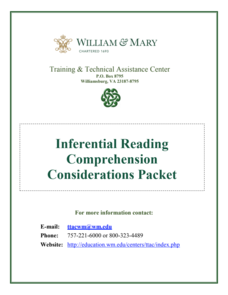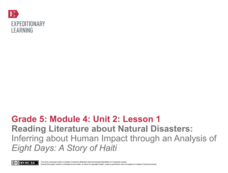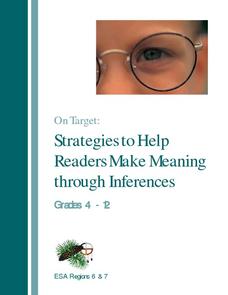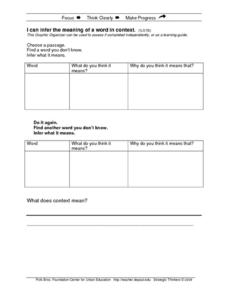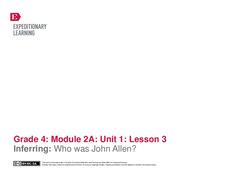Ministry of Education - Ontario
Reading Between the Lines
Learning to read between the lines, to recognize the on-the-surface meaning as well as the implied or inferred meaning of text, is an important skill for all readers. The materials and activities in this 73-page packet are designed to...
Have Fun Teaching
Inferences (2)
Encourage young readers to use their prior knowledge, as well as text clues, to draw inferences from text. Provide them with this worksheet that asks them to record a passage, the background information they already have, the text clues...
William & Mary
Inferential Reading Comprehension Considerations Packet
Don't forget to read between the lines! Educators learn tips and activities to help scholars learn to infer to increase reading comprehension. Activities suggested include think alouds, backwards words, and who's who. the packet includes...
Curated OER
Sequence, Predict, Infer: Pink and Say
Practice sequencing with your 2nd graders via Patricia Polacco's Civil War book Pink and Say. Begin with a blindfold and a bag of mystery items. Connect their use of clues to identify what they can't see with the skill of making...
EngageNY
Reading Literature about Natural Disasters: Inferring about Human Impact through an Analysis of Eight Days: A Story of Haiti
This is a disaster. Scholars look through the book Eight Days: A Story of Haiti and discuss their wonderings about the text and natural disasters. They then complete a first read to determine gist and second read to answer text-dependent...
Have Fun Teaching
Making Inferences (1)
Provide readers with an opportunity to practice drawing inferences by giving them this activity. Kids identify the text and author, record a sentence they believe infers rather than directly says, and then write the deeper meaning the...
Curated OER
Mini-Lesson Planning for Inferences
Making inferences and drawing conclusions is a key component to successful active reading. Encourage your class to use context clues and prior knowledge to infer different elements of a story, including the setting, plot, and character...
Curated OER
Using Word Parts to Infer Meaning
Students examine the importance of physical activities and use word parts to infer meaning to a story. They discuss agility, baseball, and ballet dancing, read an article, and observe a demonstration on breaking down words and examining...
Curated OER
On Target: Strategies to Help Readers Make Meaning through Inferences
Here's a resource that explicitly teaches, models, and provides readers with opportunities to practice the process of drawing inferences from text. Packed with strategies elementary, middle, and high school teachers can use, the resource...
Curated OER
"The Wind" by James Reeves
Inntroduce primary learners to essential critical reading strategies with an activity based on James Reeves' poem, "The Wind." Learners listen as the poem is read, first as a riddle, and then re-read with the title visible. The class...
Prestwick House
Connotative vs. Denotative Meanings
Besides the dictionary definition, words also carry the added weight of meanings that are inferred or implied, meanings conferred on words, or connotations. To gain an understanding the importance of connotation, class members engage in...
EngageNY
Reading Literature about Natural Disasters: Inferring about the Impact of Hurricane Katrina on People Living in New Orleans
I survived! Scholars read a firsthand account from a natural disaster survivor in the text Save Bella! They record the gist of the text in their journals and answer text-dependent questions. They then take notes to more deeply analyze...
Curated OER
Reading About the Journey: The Odyssey
Students practice their reading skills. In this reading fluency and comprehension lesson plan, students read instructor-selected passages from The Odyssey following the provided steps for the reading class activity that requires them to...
Curated OER
Guided Reading Organizer for Chain Reaction
The class uses Chain Reaction, a magazine, to build a better understanding of Latin and Greek roots found in scientific vocabulary. They use two attached worksheets to help them read a scientific article, using visual clues and their...
EngageNY
Launching The Performance Task: Building Background Knowledge: “War in the Pacific,” Part 1
It's all about a bit of give and take. Scholars silently read War in the Pacific and circle any unfamiliar words. Using context clues, they write each word on a strip of paper along with the inferred definition. After looking the word up...
West Corporation
Making Inferences – Use Your Mind to Read!
How can you tell if someone is happy? The lesson works with elementary and middle school scholars to activate their schema and pay attention to details to make inferences in their daily lives, poetry, and other literature. Cleverly...
Polk Bros Foundation
I Can Infer the Meaning of a Word in Context
Work on developing strategies for determining the meaning of unknown words and phrases with a quick context clues exercise. Class members choose two words from their reading and write down what they think they mean and why. See the...
Novelinks
The True Confessions of Charlotte Doyle: Magic Square Vocabulary
After reading chapter one of The True Confessions of Charlotte Doyle by Avi, take part in a magic square vocabulary activity in which scholars match the term with its definition and insert its corresponding number in to the magic square...
Curated OER
Two Greedy Bears
Improving listening comprehension skills is the goal of this language arts lesson. Young readers listen to the story Two Greedy Bears, stopping to have discussions with a partner. They predict outcomes and make inferences based on...
Curated OER
Using Print Media in the LCTL Classroom
Explore newspapers as a form of print media. They examine headlines from newspapers and infer meanings of the headlines. They skim articles for information and exchange articles between groups. They complete charts while skimming the...
Curated OER
The Crucible Reading Guide
In this reading comprehension worksheet, students read acts 1-4 of Arthur Miller's The Crucible and then respond to 58 short answer questions based on the reading selection.
Curated OER
Theme: The Search for Meaning
Students explore themes. In this literary elements lesson, students view a PowerPoint presentation defining and describing examples of common theme traits. Students read several short passages, then infer the theme of each story.
EngageNY
Inferring: Who was John Allen?
Help your learners work with difficult or archaic words. A continuation of lesson two of this module, the plan here focuses on deciphering the Inventory of John Allen, in particular the unfamiliar words that make up much of the list. Add...
Curated OER
Hermeneutics: Teaching Students Author's Purpose
Your developing literary critics discuss 'perspective' and discuss how the same occurence can be interpreted by two different people in two different ways. They read Ryszard Kapuscinski's untitled poem, infer meaning of the poem, and...




